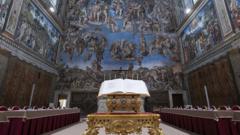As the sun sets over Vatican City, the air is charged with anticipation as 133 cardinals are set to begin their secret conclave in the Sistine Chapel, tasked with electing the next Pope after the death of Pope Francis. The event is kicking off with a mass at St. Peter's Basilica at 10:00 a.m. local time, led by the 91-year-old Cardinal Dean Giovanni Battista Re, who presided over the late pontiff’s funeral.
In preparation for the conclave, the Vatican will temporarily disable mobile signals within its borders, ensuring that none of the cardinals can communicate externally during this critical process. As the clock strikes 16:15 (15:15 BST), the cardinal electors will convene in the Pauline Chapel for a solemn procession to the Sistine Chapel. Their journey will be accompanied by the chanting of hymns, invoking the Holy Spirit's guidance in their choice.
Upon arrival, the cardinals will take an oath of secrecy before commencing their election process. The Master of Pontifical Liturgical Celebrations, Diego Ravelli, will announce "extra omnes," signaling the beginning of the conclave and sealing the entrances of the Apostolic Palace. Despite the potentially historic significance of the first ballot, which has not led to a pope being elected on the first try for centuries, the importance of consensus-building among the cardinals cannot be understated.
Cardinals will cast their votes in a series of ballots, with the first serving as a gauge for which candidates have garnered significant support. If no candidate achieves the required two-thirds majority, the process will linger into the night as cardinals gather for discussions at the guesthouse, Casa Santa Marta, over light meals. Expectations are high, and compared to political campaigns, this conclave is more about collaboration rather than competition.
The following days will unfold with early breakfast and consecutive votes, amidst the shadows of the Sistine Chapel. Outside, thousands of hopeful onlookers anticipate the smoke signal that will herald the election of the new pope, symbolizing a pivotal moment in Catholic history. While there are many speculated candidates, the outcome of this conclave remains uncertain, illustrating the unpredictability of the Vatican's inner workings.
In preparation for the conclave, the Vatican will temporarily disable mobile signals within its borders, ensuring that none of the cardinals can communicate externally during this critical process. As the clock strikes 16:15 (15:15 BST), the cardinal electors will convene in the Pauline Chapel for a solemn procession to the Sistine Chapel. Their journey will be accompanied by the chanting of hymns, invoking the Holy Spirit's guidance in their choice.
Upon arrival, the cardinals will take an oath of secrecy before commencing their election process. The Master of Pontifical Liturgical Celebrations, Diego Ravelli, will announce "extra omnes," signaling the beginning of the conclave and sealing the entrances of the Apostolic Palace. Despite the potentially historic significance of the first ballot, which has not led to a pope being elected on the first try for centuries, the importance of consensus-building among the cardinals cannot be understated.
Cardinals will cast their votes in a series of ballots, with the first serving as a gauge for which candidates have garnered significant support. If no candidate achieves the required two-thirds majority, the process will linger into the night as cardinals gather for discussions at the guesthouse, Casa Santa Marta, over light meals. Expectations are high, and compared to political campaigns, this conclave is more about collaboration rather than competition.
The following days will unfold with early breakfast and consecutive votes, amidst the shadows of the Sistine Chapel. Outside, thousands of hopeful onlookers anticipate the smoke signal that will herald the election of the new pope, symbolizing a pivotal moment in Catholic history. While there are many speculated candidates, the outcome of this conclave remains uncertain, illustrating the unpredictability of the Vatican's inner workings.





















